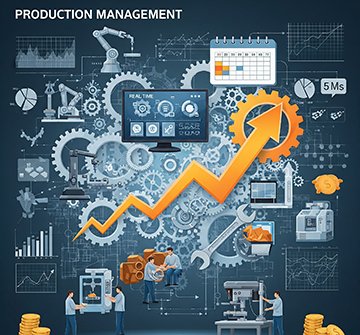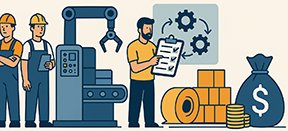Published: September 02, 2025 | Updated: October 24, 2025
Published: September 02, 2025 | Updated: October 24, 2025
Understanding Production Management: A Comprehensive Overview
 Production management guides the transformation of raw materials into finished products. This critical field plans, organizes, and controls the production process, ensuring efficient and effective operations. It holds immense importance across diverse industries, from large-scale manufacturing to intricate service sectors, directly influencing a company's financial health and market standing. Let's delve into more understanding of production management with a comprehensive overview.
Production management guides the transformation of raw materials into finished products. This critical field plans, organizes, and controls the production process, ensuring efficient and effective operations. It holds immense importance across diverse industries, from large-scale manufacturing to intricate service sectors, directly influencing a company's financial health and market standing. Let's delve into more understanding of production management with a comprehensive overview.
Production management offers a multifaceted approach to achieving operational excellence. While production often receives primary focus, the significance of maintenance cannot be understated. A holistic perspective recognizes both as vital gears in a well-oiled machine. This discussion delves into the definition of production management, explores its five crucial aspects, outlines its tangible benefits, and examines the fundamental "5 Ms" framework. We identify how a Computerized Maintenance Management System (CMMS) becomes an indispensable ally, supporting and enhancing each facet of production management.
What Is Production Management and Why It Matters in Manufacturing
At its simplest, production management represents the deliberate oversight and coordination involved in converting raw resources into sellable goods. This process involves a systematic approach to planning, organizing, and controlling every stage of production to guarantee both efficiency and effectiveness. This discipline plays a pivotal role in myriad industries. Consider a textile manufacturer; production management ensures raw cotton moves through spinning, weaving, dyeing, and finishing, becoming a final garment with minimal waste and maximum throughput. The direct impact on a company's profitability and market competitiveness makes this field an essential driver of business success.
Five Critical Aspects of Production Management
Effective production management relies on several interdependent aspects. Communication stands as a central pillar throughout all of these areas. Without clear and concise information exchange, goals remain elusive.
1. Meticulous Planning: Setting the Course
Production starts with meticulous planning. Companies establish a clear path forward, setting both long-term strategic goals and short-term tactical objectives. This involves identifying potential obstacles and formulating proactive solutions. Managers craft comprehensive plans outlining the resources, timelines, and targets necessary to meet customer demand. This phase incorporates forecasting future demand, analyzing current capacity, and pinpointing potential bottlenecks.
Industry Example: A large-scale bakery plans its daily production schedule based on anticipated bread and pastry sales, factoring in seasonal demand spikes. A CMMS proves invaluable here by providing historical data on equipment uptime and maintenance schedules, allowing planners to accurately assess machine availability and avoid overcommitting production.
2. Rigorous Control: Monitoring Progress and Quality
Once a plan exists, effective control mechanisms become crucial for monitoring progress and identifying deviations from the intended course. Companies implement stringent quality control measures to ensure products meet specific standards. They track key performance indicators (KPIs) to measure efficiency and productivity.
Industry Example: Toyota's renowned "Just-in-Time" (JIT) system serves as a prime example of exceptional control, minimizing inventory and maximizing efficiency. A CMMS supports this by providing real-time data on machine performance and potential failures. If a critical machine shows early signs of wear, the CMMS triggers a work order, allowing maintenance teams to address the issue before it causes a production stoppage.
Discover how streamlined maintenance processes can elevate production. Learn more.
3. Efficient Scheduling: Allocating Resources Precisely
Efficient scheduling becomes paramount for maximizing resource utilization and meeting delivery deadlines. Production managers create detailed schedules that assign tasks to specific workers, machines, and time slots. This process considers factors like machine setup time, worker availability, and material flow to ensure a smooth, uninterrupted production process.
Industry Example: A pharmaceutical manufacturer must maintain incredibly precise scheduling to comply with strict regulatory requirements. A CMMS helps here by presenting a clear picture of equipment status and predicted availability. It can integrate with production scheduling software, flagging potential conflicts if a machine requires an unexpected repair or planned calibration, helping the production team adjust schedules in real time.
4. Continuous Process Improvement: Seeking Better Ways
Never settle for current successes. Always look for improvements. This involves identifying ways to reduce waste, enhance workflows, and improve overall operations. Lean manufacturing principles, for instance, focus on eliminating non-value-added activities to increase efficiency and reduce costs. Encourage collaboration on projects, and support needed vacations and workday breaks.
Industry Example: An automotive parts supplier consistently seeks ways to reduce scrap material. A CMMS tracks equipment performance and maintenance history. It can show which machines experience more breakdowns or produce more scrap, guiding process improvement initiatives. Maintenance data gathered by the CMMS reveals recurring issues, allowing production teams to implement permanent solutions.
5. Proactive Maintenance: Sustaining Operational Integrity
While production often takes center stage, maintenance remains an essential component. Regular upkeep of machinery and equipment helps prevent breakdowns and ensures optimal performance. Production and maintenance managers frequently collaborate to plan and schedule preventive maintenance activities. This proactive approach sustains the reliability and efficiency of production systems.
Industry Example: A food processing plant relies on sophisticated machinery. A sudden breakdown of a critical cooker can halt an entire production line, leading to significant product spoilage. A CMMS forms the backbone of such a program. It schedules preventive maintenance tasks, tracks parts inventory, records repair history, and helps maintenance teams identify trends that might indicate future failures.
Real Benefits of Production Management in Manufacturing
When companies effectively implement the aspects of production management, they gain numerous advantages.
Increased Efficiency
- Optimal Resource Utilization: Careful planning and scheduling ensure that a company uses resources like labor, machinery, and materials efficiently and effectively. Companies minimize waste and maximize output.
- Reduced Lead Times: Products reach customers faster without cutting corners, accelerating delivery.
Improved Quality
- Enhanced Product Consistency: Rigorous quality control measures and standardized processes ensure products consistently meet or exceed customer expectations.
- Reduced Defects and Rework: Identifying and addressing potential quality issues early in the process minimizes the need for rework and reduces costs associated with defective products. A CMMS aids quality by helping maintain machines in calibration.
Cost Reduction
- Economies of Scale: Reducing per-unit production costs becomes achievable through efficient management.
- Minimized Waste: Proper management actively seeks to reduce excess materials or overproduction, leading to significant cost savings. The data from a CMMS on equipment efficiency directly informs waste reduction efforts.
Enhanced Customer Satisfaction
- Meeting Delivery Deadlines: Customers respond positively when products arrive on time or early.
- Improved Product Quality: Customers stay loyal when they receive a superior product consistently. A CMMS supports this by ensuring equipment operates within its specifications, directly impacting product quality.
Competitive Advantage
- Faster Time-to-Market: Companies introduce new products and respond to market trends more quickly, gaining a competitive edge.
- Cost Leadership: Reducing costs and improving efficiency helps companies achieve a cost leadership position in the market.
Risk Mitigation
- Supply Chain Resilience: Strong communication up and down the supply chain helps lessen the impact of disruptions.
- Reduced Operational Risks: Working with maintenance and adhering to prescribed regulations and policies minimizes the likelihood of production breakdowns, accidents, and other operational issues. A CMMS directly addresses operational risks by preventing equipment failures and supporting safety protocols.
Data-Driven Decision Making
- Informed Decisions: Collecting and analyzing production data helps identify areas for improvement. A CMMS provides a wealth of data on equipment performance, maintenance costs, and downtime, directly supporting informed decision-making for production managers.
Understanding the 5 Ms of Production Management
 The "5 Ms" framework offers a comprehensive overview of the key elements involved in production management:
The "5 Ms" framework offers a comprehensive overview of the key elements involved in production management:
- Men (or Manpower): Human resources remain the backbone of any production process. A CMMS simplifies the management of maintenance personnel, including their training records.
- Machines: The machinery and equipment used in production significantly influence efficiency and productivity. Managers oversee the acquisition, maintenance, and utilization of machines. This is where a CMMS provides its most direct value, managing every aspect of machine upkeep.
- Methods: The methods and techniques employed in production significantly impact output and quality. Regularly evaluate and improve production methods to suit specific needs. A CMMS can help track the effectiveness of various maintenance methods, informing improvements to production processes.
- Materials: Companies must source quality raw materials. Managers hold responsibility for procurement and waste disposal. A CMMS helps manage spare parts inventory for machines, indirectly contributing to the efficient handling of "Materials" for production.
- Money: Financial resources always remain a concern, encompassing budgets and the bottom line. By reducing downtime and extending asset life, a CMMS directly impacts the "Money" aspect by lowering overall operational costs.
Future-Proofing Manufacturing with Strong Production Management
Production management encompasses the entirety of the production process, drawing on all five Ms. By employing strong communication skills, companies simplify every stage, from initial planning onward. Staying vigilant and disciplined allows efforts to come to fruition, driving sustainable growth and success in a competitive landscape.
By utilizing a CMMS in your operations, you greatly enhance the five Ms. Call Mapcon today at 800-922-4336 for a free demonstration.
FAQs
What is the core definition of Production Management?
Production management is the systematic oversight and coordination involved in converting raw resources into sellable goods while ensuring efficient and effective operations.
What is the importance of "Meticulous Planning" in Production Management?
Planning is crucial for setting long-term goals, analyzing capacity, and forecasting demand to ensure the company meets customer needs and avoids production bottlenecks.
How does Proactive Maintenance sustain operational integrity?
Regular upkeep of machinery helps prevent sudden breakdowns, ensures optimal equipment performance, and sustains the overall reliability and efficiency of the production system.
Which four benefits does effective Production Management deliver to a company?
Effective production management delivers increased efficiency, improved quality, cost reduction, and enhanced customer satisfaction.
What are the five core elements, or "5 Ms," that comprise the Production Management framework?
The five core elements are Men (manpower), Machines, Methods, Materials, and Money.
How does CMMS software from MAPCON directly support the "Machines" element of Production Management?
The CMMS provides its most direct value by managing every aspect of machine upkeep, including scheduling preventive maintenance and tracking equipment history to ensure maximum uptime.
MAPCON CMMS software empowers you to plan and execute PM tasks flawlessly, thanks to its wealth of features and customizable options. Want to see it for yourself? Click the button below to get your FREE 30-day trial of MAPCON!
Try It FREE!